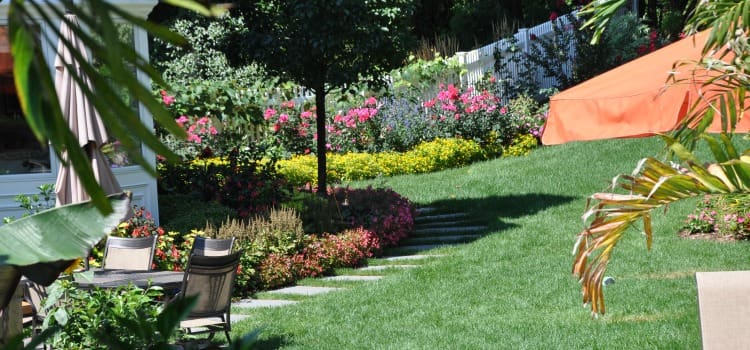It takes time, effort and a year-round commitment to keep a healthy green lawn. Mowing the lawn is just the beginning. A beautiful lawn requires expert plant knowledge, skill and landscape experience for proper care and the right products and equipment for proper maintenance. DIY lawn care is an option, but most homeowners don’t have the required amount of time or energy. Professional lawn care in NJ is the best way to ensure a year-round beautiful lawn. Here are 20 expert tips for great lawn care.
1. Clean Up Your Yard
Bergen County experiences 4 seasons, and particularly in the fall you may have dead grass, trees and shrubs that need pruning and leaves that have blown onto your property. It’s important to focus on cleaning up your yard so new growth can flourish.
- Remove yard debris like trash, fallen tree limbs and branches, pine cones, acorns and rocks
- Remove dead plants and dead plant growth
- Rake up twigs and dead leaves
- Inspect your lawn, plants, trees and shrubs for signs of insects and pests
Once your yard is clean, you can focus on other important landscape tasks for proper lawn care in New Jersey.
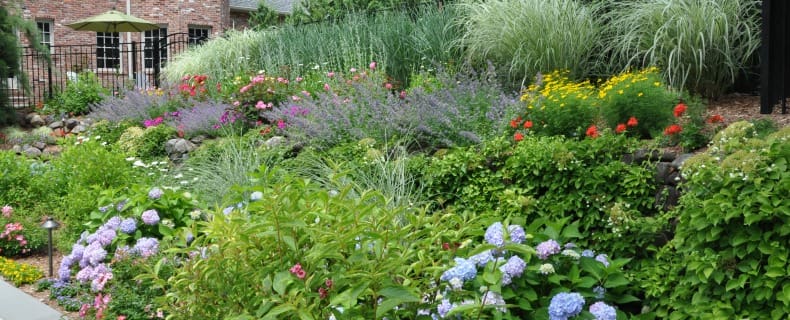
2. Schedule Regular Maintenance
The first and most important step to good lawn care in NJ is regular care and maintenance. It’s essential to keep your lawn well-maintained and healthy throughout the year. When you hire a reputable, Bergen County landscape company, you can expect expert care and quality services. An experienced crew will be assigned to your home to take care of all of your landscaping needs as scheduled weekly, so you won’t have to worry about proper lawn care for your home. Typical services include:
- Lawn mowing
- Regular weeding
- Border edging
- Cleaning of hardscaped surfaces
- Spring yard cleanup to remove dead winter growth and debris
- Fall yard cleanup to remove debris and prepare for winter

3. Plant the Right Grass
If you want a beautiful lawn, you need to plant the right grass. Climate and weather conditions, soil type and light conditions have a big impact on the growth patterns and root systems of grass, so it’s important to plant the right type of grass for your existing landscape conditions. Grasses are divided into two types – cool-season grasses and warm-season grasses.
- Cool-Season Grasses – Cool-season grasses grow best in fall, winter and early spring. They like mild, wet winters and do well in colder weather with snow and ice. They like summers that are warm or hot, but not dry, and they grow best in areas with at least 30 inches or more of yearly rainfall. In Northern NJ, cool-season grasses like bluegrass, perennial ryegrass, fine and tall fescues and wheat grass are common.
- Warm-Season Grasses – Warm-season grasses grow best in late spring and summer. They like mild winters and summers that are hot, humid and dry, and they grow best in areas with 20 inches or less of yearly rainfall. Warm-season grasses like buffalo grass, Bermuda grass, St. Augustine grass and zoysia are typically found in the southern and western regions of the country where temperatures are temperate and mild year-round.
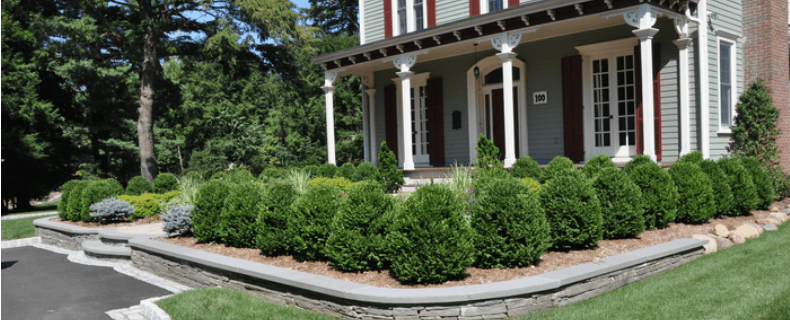
4. Mow Your Lawn Regularly
Weekly lawn mowing is an essential part of proper lawn care. It helps to build thicker, stronger turf that’s less susceptible to damage from lawn diseases and outdoor insects and pests. Regular mowing is essential to a healthy lawn, but you need to make sure that you’re mowing correctly. Improper mowing is one of the most common causes of lawn damage. Using the wrong type of mower or incorrect mowing techniques can actually do significant damage to your lawn. Proper mowing has a big impact on the health and appearance of your lawn. When you mow your lawn:
- Don’t mow in the same direction every time. This can compact the soil.
- Never mow the lawn when the grass is wet. This can cause an uneven cut and a messy look. Also, it can clog your lawn mower causing more maintenance.
- Make sure your lawn mower blades are always sharp and clean.
Helpful Mowing Tip: Adjust the mower height up a notch on Memorial Day and again on July 4th. Adjust it down a notch on Labor Day, and again on Columbus Day.

5. Adjust Your Mower Blade Height
Top lawn scientists agree that when the temperature rises, so should your grass. Follow the mowing rule for proper lawn care in NJ. – Every time you mow too low, you’re opening up the lawn’s canopy. This increases weed infestation since weeds need light to grow. Tall grass has more plant tissue to retain water, produce chlorophyll and shade the ground from direct sun. This keeps grass cooler and reduces stress on grass roots. Improper mowing and using the wrong mower can cause damage to your lawn.
- Only cut off one-third of the grass blade height with each mowing.
- If your grass is overgrown, don’t try to mow it down all at once. This puts stress on the grass. Cut one-third of the grass height, let grass recover for three or four days, then mow again.

6. Test Your Soil
The texture and pH balance of soil is determined by the amount of sand, silt and clay that are present. Sand, the largest particle in the soil, creates soil that drains quickly and doesn’t hold moisture or nutrients. Silt, a medium size soil particle, feels smooth and powdery. When wet, it creates a slippery surface that helps drainage. Clay, the smallest particle in soil, is smooth when dry and sticky when wet. Soils that are high in clay, referred to as heavy soils, can hold a lot of nutrients, but they don’t let air and water penetrate well.
To test your soil, start by doing a soil test for pH balance to determine if you’re working with acid or alkaline soil conditions. You can purchase a soil test kit at a local garden or home improvement store and do your own test, or call a landscape professional to do a soil test for you. If you hire a landscape company for regular lawn care in NJ, a soil test is usually included in lawn care and maintenance.
7. Mulch Your Landscape
Mulching is a simple, inexpensive way to provide great lawn care in NJ. It provides a protective layer of material on top of the soil that creates numerous advantages for your plants, shrubs and trees. Mulch is available in both organic and inorganic compounds that will benefit your landscape. Organic mulches like bark chips, straw and grass clippings decompose naturally and help to improve soil conditions by adding organic matter back into the soil. They also provide an organic source of nutrients and set up a healthy underground environment for beneficial earthworms and other healthy organisms that benefit plants. Although inorganic mulches like landscape fabrics and synthetic materials don’t improve soil conditions, they do offer advantages in certain landscapes with steep slopes and soil erosion problems or landscapes with hard-to-water areas that need soil moisture retention. Mulching around flower gardens, shrubs and trees will give your landscape a neat, well-maintained appearance.Benefits such as:
- Moisture retention in the soil
- Even soil temperatures
- Protection from soil erosion
- Less soil compaction
- Less weed growth
- A “finished” look for your lawn and garden
Organic Mulches – Organic mulches help improve soil conditions because they decompose and put natural matter back into the soil. This process keeps the soil loose and aerated, improves plant root growth and increases moisture in the soil. Organic mulches provide a natural source of nutrients and set up a perfect environment for beneficial earthworms and other healthy organisms.
Lawn Clippings – Lawn clippings provide a lot of benefits for your lawn. When mulched back into your lawn, they add great nutrients and beneficial organic matter to the soil. Since grass clippings are mostly water, they break down quickly to provide fast benefits for your lawn care in NJ.

8. Water Wisely
You can save time and money with proper watering techniques. Of course, water is essential to all lawns, but too much or too little water can harm them. Frequent, light watering causes the grass to grow shallow roots and sets your lawn up for trouble in hot weather. Over watering establishes a perfect environment for lawn diseases. In general, your lawn needs about one-inch of water per week from rainfall or a sprinkler system. Here are some helpful watering tips:
- Deep, infrequent watering is better than light, frequent watering.
- Avoid watering between 11 am and 3 pm, the hottest part of the day.
- Water in the morning between 6 am and 10 am, when there’s less sun and wind.
- If you can’t water in the morning aim for 4 pm to 7 pm.
- Avoid watering at night, as it invites mildew and fungus.
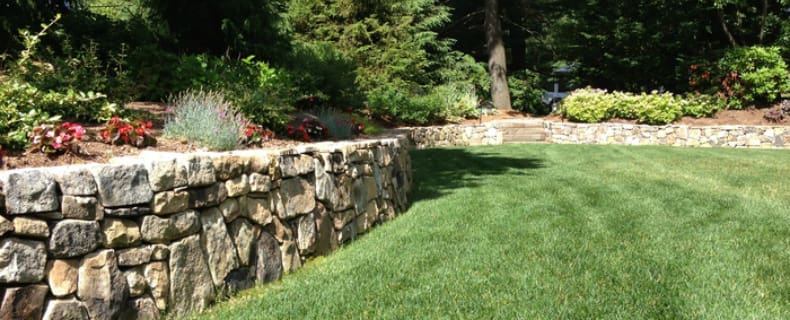
9. Fertilize Your Lawn
Fertilize your lawn properly, and you’ll have a lawn that’s lush, green and healthy year-round. Nitrogen is every lawn’s most important ingredient, but each type of grass demands different amounts of nitrogen, phosphorus and potassium for optimal growth and performance. Nitrogen helps plants produce new growth. Phosphorous promotes root growth, increases seed size, improves plant vitality and helps the plant develop buds and flowers. Potassium improves overall plant vigor. It’s important to follow proper fertilization schedules based on your grass type for the best lawn care. How often you fertilize will affect your lawn’s appearance and maintenance level. Since fertilizer stimulates root and plant growth, the more you fertilize, the more frequently you’ll need to mow the lawn.
10. Invest in a Good Spreader
If you have a large lawn or one that has rolling hills or terraced levels, invest in a good spreader for grass seed and fertilizer. It’s tiring to push a cheap spreader with a narrow handle, solid, plastic tires and an inadequate feed mechanism. Invest in a good spreader with a large handle, pneumatic tires and an edge guard to keep seed, fertilizer, and herbicide where it belongs—on the grass. A good 7-gallon spreader can spread a 10-foot-wide lawn section in one pass. A broadcast or rotary spreader works well for large lawns, while a drop spreader works best for typical suburban-size lawns. Old, worn out or cheap spreaders will waste expensive lawn care products and your valuable time.
11. Aerate Your Lawn
For a healthy, green lawn, you should aerate your lawn as part of your regular lawn care in NJ. Lawn aeration creates small holes in the soil which allows nutrients, water and oxygen to penetrate grass roots. This allows for deeper root growth and thicker, stronger grass, and reduces soil compaction which prevents proper circulation of air, water and nutrients in the soil. The best time to aerate your lawn is in the Spring when new growth is developing. This will give your grass plenty of time to heal and fill in any open areas after soil plugs are removed. Cool-season grasses should be aerated in the early Spring or Fall, while with warm-season grasses should be aerated in late Spring. Lawn aeration can be done with two types of tools – a spike aerator and a plug aerator. You can try to aerate your lawn yourself, but hiring a landscape professional with aeration knowledge, experience and proper equipment is best.
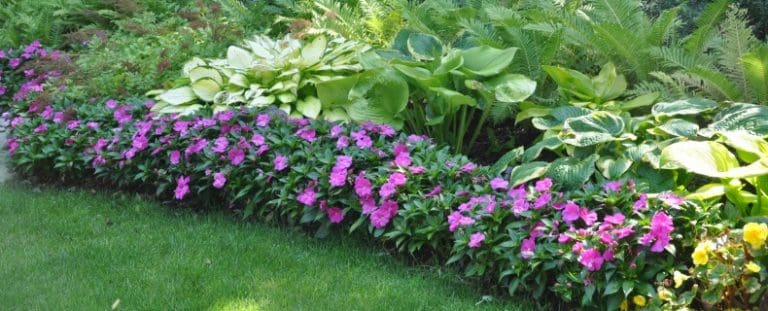
12. Recycle Grass Clippings
Feeding your lawn is important, and grass clippings contain as many nutrients as most fertilizers. When you recycle grass and leaves, you are doing what’s best for your lawn and the environment. In fact, grass clippings can provide as much as one-third of the annual feeding requirement for your lawn. In addition to recycling nutrients back into the soil, recycling your grass clippings will cut down mowing time and save time needed to bag clippings and haul them to the local landfill. Contrary to popular belief, leaving grass clippings on your lawn does not cause thatch. They are mostly water, so as long as you mow regularly at the right height, they will break down and disappear rapidly.
13. Control Weeds
Weeds fall into two main categories: broadleaf weeds and grassy weeds. Broadleaf weeds have wider leaves and include varieties like dandelions, chickweed, purslane and clover. While some broadleaf weeds may flower and look like pretty plants, they are still weeds. Grassy weeds, like crabgrass, can quickly take over your landscape before you even realize there’s a problem. One of the problems with grassy weeds is that they grow under the very same conditions as regular grass, so treating your lawn could inadvertently end up growing the weeds as well. There are hundred of weed varieties common to Northern NJ, so it’s important to include a pre-emergent herbicide in your lawn care in NJ in early Spring to prevent weed growth.
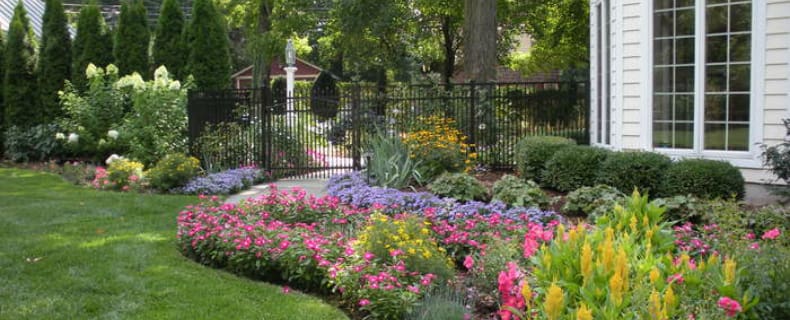
14. Get Rid of Thatch
Thatch, a mat of yellowish dead grass, blocks moisture and air in your lawn and prevents healthy grass growth. Using a de-thatching machine or power rake, you can get rid of ugly thatch before it takes over your lawn. If you rent a de-thatching machine, you’ll need to set the tines correctly. It’s better to make several shallow passes and increase the depth of the tines, rather than making one deep pass that can destroy your lawn. For proper de-thatching, it’s best to hire a professional lawn care company that has the right de-thatching equipment, skill and knowledge. If you decide to do it yourself, make sure you rent clean, well-maintained equipment. A dirty de-thatcher can spread disease and weed seed to your lawn, therefore, you should always get rid of thatch in your lawn.
15. Control Insects and Outdoor Pests
Professional lawn care and regular maintenance will keep your lawn looking its best, but without some type of pest control your lawn is susceptible to numerous outdoor insects and pests. Not all insects and pests cause lawn damage, but those that do can quickly destroy your lawn. Small, hard-to-see insects like aphids, mealybugs, caterpillars and beetles can invade your lawn, and underground pests that are hard to spot like grubs, wire worms, slugs and fire ants can invade your soil. Once this happens, it’s very difficult to get rid of them without the use of herbicides and pesticides. To keep your lawn green and healthy year-round, pest control should be a part of your regular lawn care in NJ.
An Integrated Pest Management Program (IPM) focuses on safe, gentle pest control solutions that keep your lawn and landscape insect and pest free. If you have existing insect and pest problems, a professional lawn care company can identify the pests and offer the right pest control solutions to clear up the problems.
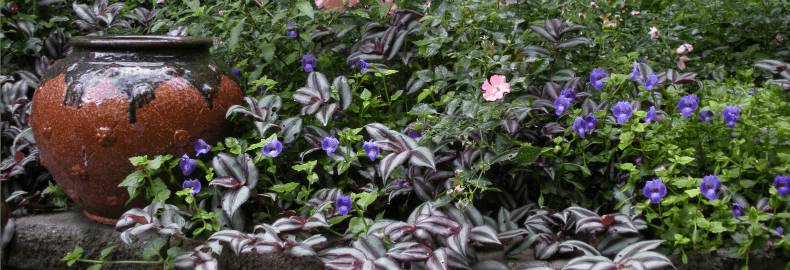
16. Watch Out for Lawn Diseases
All lawns are subject to diseases, but malnourished and ill-maintained laws are most susceptible. Most lawn diseases are caused by fungi that invade soil and grass blades. Fungal spores can be easily spread by insects, rain, wind, contaminated soil and foot traffic on wet grass. Common lawn diseases in Northern NJ include: Dollar Spot; Fusarium Patch; Rust; Plythium Blight; Fairy Ring; and Mushrooms. All of these lawn diseases can cause serious damage to your lawn. Proper treatments are essential to eliminate existing lawn diseases and prevent them from destroying your entire lawn. If you notice bare spots; brown or yellow spots; dead patches of grass; white, cob-web like spots; bright green patches; or reddish-brown grass blades, contact a Bergen County landscape professional who can help you with lawn diseases and lawn care in NJ.

17. Invest in Organic Lawn Care
Organic lawn care in NJ provides a safe, chemical-free environment for your home. By using completely natural, organic lawn care products, you promote green living and protect the environment from harsh chemicals that can be absorbed into the soil and water. Organic lawn care also promotes a natural aeration and drainage system in the soil with organic mixtures that naturally control weed growth, plant diseases and harmful insects and pests. Organic solutions help to establish a natural ecosystem in your landscape where beneficial insects and organisms exist in the soil. Unlike many traditional lawn care products, organic lawn care products contain no chemicals that can potentially harm your family or pets. Organic lawn care in NJ provides a safe, chemical-free environment and many benefits for your Bergen County lawn. Applications are usually done in the Spring, Summer and Fall.
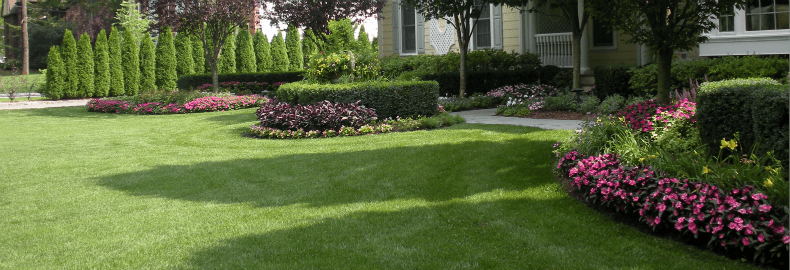
18. Prune Your Trees and Shrubs
Overgrown trees and shrubs create an ill-maintained landscape and invite diseases, insects and pests to your home. They can also create hazardous or dangerous conditions for your home. Overgrown trees get top-heavy and out of shape. They’re more likely to drop large limbs and branches or fall in storms and high winds. Overgrown trees and shrubs near your house make you a target for burglars who are easily hidden by overgrowth. Take time to prune trees and shrubs, but make sure you do it correctly and at the right time of year. Although pruning may seem like a simple task, you can cause serious damage to your trees and shrubs if you do it the wrong way.
Most pruning is done in Spring or early Fall after old blooms fade or before new blooms sprout. This maximizes flower and foliage production for the following year. Pruning in late Spring or early Fall makes it easier to examine the plant’s structure and make proper cuts. Pruning tall trees and shrubs can also be dangerous. It requires ladders and pole-type pruners to reach tall heights. This type of pruning is best left to a landscape professional with proper pruning skills and equipment for lawn care in NJ.
19. Over-Seed Your Lawn
Late Summer or early Fall is a great time to over-seed your lawn. It helps to heal cool-season lawns that have been damaged by summer drought, diseases, insects, pests or heavy foot traffic. Cool-season grasses, common in Northern NJ lawns, grow best when air temperatures are between 60 and 75 degrees Fahrenheit. Since cooler fall weather arrives earlier the further north you go, the timing of fall over-seeding depends more upon daily temperatures than it does on the calendar. A good rule of thumb is to over-seed early enough in late Summer or early Fall to give the grass seed time to germinate and the seedlings time to mature before winter. Over-seeding your lawn helps to repair bare spots, brown patches and dead grass areas in your lawn. Think of it as a quick-fix for good lawn care in NJ.
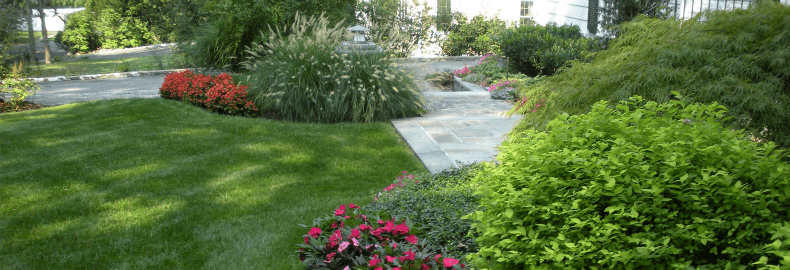
20. Keep Lawn Borders Neatly Edged
Creating a neat edge or border around hardscaped surfaces like driveways, sidewalks and walkways makes lawn care easier. Doing this will keep grass from growing into unwanted areas and protects your lawn from encroaching weeds. For best results, you’ll need an electric or gas edger. Hand edging tools are not efficient, especially if you have a large yard. When you hire a professional landscape company, regular border edging around hardscaped surfaces, garden areas and trees, shrubs and plants is typically included in regular lawn care in NJ.
Garden areas and flower beds need clear borders to stand out in your landscape. Garden edging will keep your garden protected from overgrowth and weeds. Plastic and metal edging is cheaper, but it isn’t flexible or attractive. Consider creating edges and borders with beautiful stone, brick or concrete pavers, timbers, stacked stone, rocks, gravel, bark chips or straw for eye-catching borders. Beautiful border edging can give your landscape unique style and enhance architectural features on your home.
21. Plant the Right Flowers, Plants and Shrubs
There’s a wide variety of landscape plants to choose from, but it’s important to choose varieties that will thrive in your existing landscape conditions. Soil type, light conditions, water requirements and planting locations will all impact plant growth. Make sure that you select seasonal flowers and landscape plants and shrubs that will grow well in Northern New Jersey. New Jersey is separated into four different planting zones – 6a, 6b, 7a and 7b. Bergen County is located in planting zones 6b and 7a.
The USDA plant hardiness zone map takes low winter temperatures, elevation levels, urban heat effects and the closest large body of water into consideration when assigning planting zones. Planting zone information serves as a planting guide for optimal growth. Whether you plant a colorful flower garden, an edible garden, container gardens or border plants and shrubs, it’s important to select plants that will thrive in your planting zone. A professional landscape company can help you choose the best plants for your existing landscape conditions to ensure proper lawn care in NJ.
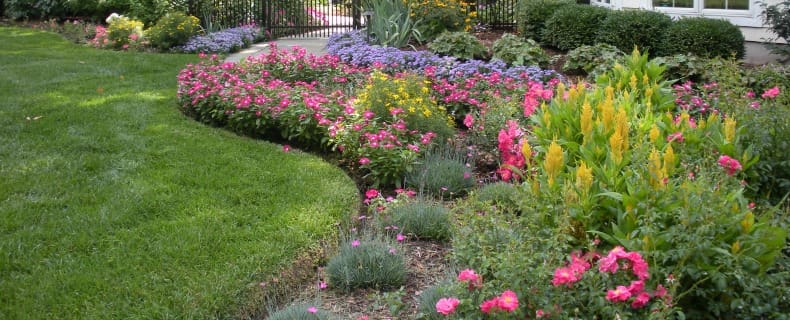
22. Aerate Your Lawn
After a harsh Northeastern winter, soil can be dry, depleted of nutrients and compacted. None of these things promote new grass growth or a healthy lawn. Lawn aeration, a process of perforating the soil with small holes, loosens the soil and allows water, air and nutrients to reach grass roots. Aerating your lawn helps to promote deep root growth and thicker grass. When you aerate your lawn, your grass has adequate time to recover after soil plugs are removed.
Cool-season grasses, typical in Northern NJ, should be aerated in the early Spring or Fall, while warm-season grasses should be aerated in late Spring.
Lawn aeration can be done with two types of tools – a spike aerator that punches holes in the soil and a plug aerator that removes plugs of grass and soil. You can aerate your own lawn, but you probably won’t get the best result. It’s best to hire a landscape professional with aeration knowledge, experience and proper equipment. For a healthy, green lawn year-round, you should aerate your lawn as part of your regular lawn care in NJ.
23. Control Weed Growth
There never seems to be a problem achieving growth when it comes to weeds. Proper lawn care in NJ is essential to prevent weed growth. In the right conditions, aggressive weeds like dandelions, thatch, crabgrass and foxtails can quickly take over your landscape before you even realize there’s a problem. Once they pop up, they are very difficult to get rid of without some type of weed control.
Weeds fall into two main categories: broadleaf weeds and grassy weeds. Broadleaf weeds have wider leaves and include varieties like dandelions, chickweed, purslane and clover. While some broadleaf weeds may flower and look like pretty plants, they are still weeds. Grassy weeds like crabgrass and thatch can quickly take over your entire lawn. One of the problems with grassy weeds is that they grow under the same conditions as regular grass, so they are hard to control in your lawn. There are hundreds of weed varieties that are common to Northern NJ, so it’s important to include a pre-emergent herbicide in early Spring to prevent all types of weed.
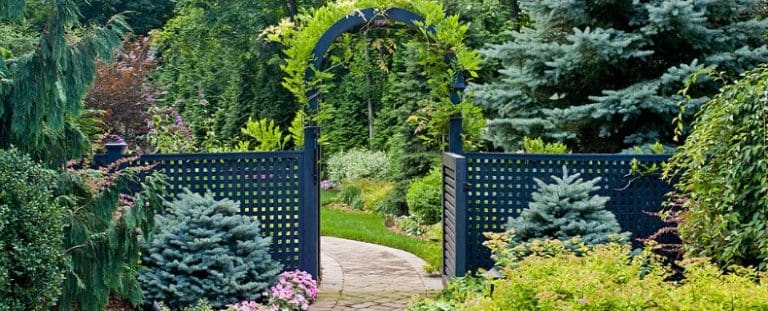
24. Control Insects and Pests
Professional lawn care and regular maintenance will keep your lawn looking its best, but without some type of pest control your lawn is susceptible to numerous outdoor insects and pests. Not all insects and pests cause lawn damage, but those that do can quickly destroy your lawn. Small, hard-to-see insects like aphids, mealybugs, caterpillars and beetles can invade your lawn, and underground pests that are hard to spot like grubs, chinch bugs, sod webworms, wireworms, slugs and fire ants can invade your soil. Once this happens, it’s very difficult to get rid of them without the use of herbicides and pesticides. To keep your lawn green and healthy year-round, pest control should be a part of your regular lawn care in NJ.
An Integrated Pest Management Program (IPM) focuses on safe, gentle pest control solutions that keep your lawn and landscape insect and pest free. If you have existing insect and pest problems, a professional lawn care company can identify the pests and offer the right pest control solutions to clear up the problems. Talk to a professional Bergen County landscape company about an Integrated Pest Management Program for your home.
25. Maintain Your Lawn Equipment
If you’re taking care of your own lawn care in NJ, you’ll need to invest in a good lawn mower, edger, hedger, trimmer, pruner, leaf blower, rake and various hand tools. Good lawn and garden equipment is expensive, so you need to protect your equipment by keeping it clean and well-maintained. After each mowing, clean the lawn mower bottom and blades to remove grass clippings and debris. Remove grass from edgers and trimmers. If you’re using a string trimmer, replace the string when it looks worn or old. Lawn mowers typically last about six years, but they will last longer with good maintenance.
For winter storage, follow the manufacturer’s recommendations for fuel tanks. Note that ethanol gasoline decomposes quickly in storage. It can damage or even ruin your mower and other gas-fueled lawn equipment over the winter.

